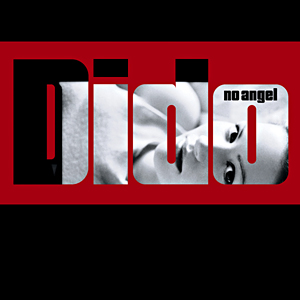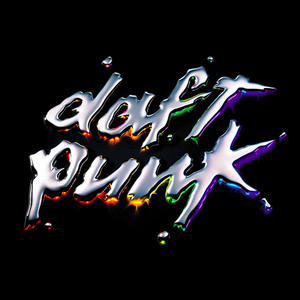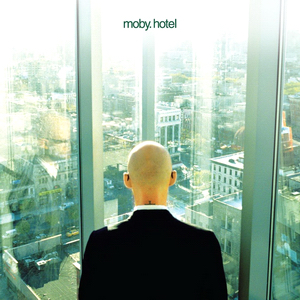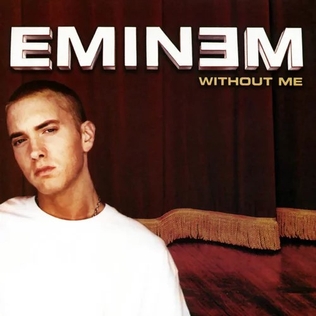
The Eminem Show is the fourth studio album by American rapper Eminem. After it had originally scheduled for release on June 4, 2002, the album was released nine days earlier on May 26, 2002, through Aftermath Entertainment, Shady Records, and Interscope Records due to pirating and bootlegging of it. The album saw Eminem take a substantially more predominant production role; most of it was self-produced, with his longtime collaborator Jeff Bass. It features guest appearances from Obie Trice, D12, Dr. Dre, Nate Dogg, Dina Rae and Eminem's daughter Hailie Jade Scott-Mathers.

Hybrid Theory is the debut studio album by American rock band Linkin Park, released on October 24, 2000, through Warner Bros. Records. Recorded at NRG Recordings in North Hollywood, California, and produced by Don Gilmore, the album's lyrical themes deal with problems lead vocalist Chester Bennington experienced during his adolescence, including drug abuse and the constant fighting and divorce of his parents. Hybrid Theory takes its title from the previous name of the band as well as the concept of music theory and combining different styles. This is also the only album on which bassist Dave Farrell does not play.

Meteora is the second studio album by American rock band Linkin Park. It was released on March 25, 2003, through Warner Bros. Records, following Reanimation, a collaboration album which featured remixes of songs included on their 2000 debut studio album Hybrid Theory. The album was produced by the band alongside Don Gilmore. The title Meteora is taken from the Greek Orthodox monasteries originally bearing the name. Meteora has a similar sound to Hybrid Theory, as described by critics, and the album took almost a year to be recorded. It is the first Linkin Park studio album to feature bassist Dave Farrell after he rejoined the band in 2000 following his temporary touring with other bands.

Nirvana is a greatest hits album by the American rock band Nirvana, released on October 29, 2002. It was the third Nirvana album released following the death of vocalist and guitarist Kurt Cobain in 1994.

No Angel is the debut studio album by English singer-songwriter Dido. Originally released on 1 June 1999 in the United States, the album found a mass audience when it was released worldwide in February 2001. By 2003, the album had sold more than 15 million copies worldwide, and was the second best-selling album of the 2000s in the United Kingdom, behind James Blunt's Back to Bedlam.

Come Away with Me is the debut studio album by American recording artist Norah Jones, released on February 26, 2002, by Blue Note Records. Recording sessions took place at Sorcerer Sound Studio in New York City and Allaire Studios in Shokan, New York.
Adeva is an American singer. She had a string of successful house and R&B hits in the late 1980s to early 1990s, including "Warning!", "I Thank You" and "Respect".

Play is the fifth studio album by American electronic musician Moby. It was released on May 17, 1999, through Mute Records internationally and V2 Records in North America. Recording of the album began in mid-1997, following the release of Moby's fourth album, Animal Rights (1996), which deviated from his electronica style; Moby's goal for Play was to return to electronica, blending downtempo with blues and roots music samples. Originally intended to be his final record, the album was recorded at Moby's home studio in Manhattan.

Greatest Hits is a compilation album by the British rock band Queen, released worldwide on 26 October 1981. The album consisted of Queen's biggest hits since their first chart appearance in 1974 with "Seven Seas of Rhye", up to their 1980 hit "Flash". There was no universal track listing or cover art for the album, and each territory's tracks were dependent on what singles had been released there and which were successful. In 1992, the US version of the album Classic Queen was released following the band's rekindled popularity in the nation.

Discovery is the second studio album by the French electronic music duo Daft Punk, released on 12 March 2001 by Virgin Records. It marked a shift from the Chicago house of their first album, Homework (1997), to a house style more heavily inspired by disco, post-disco, garage house, and R&B. Thomas Bangalter of Daft Punk described Discovery as an exploration of song structures, musical forms and childhood nostalgia, compared to the "raw" electronic music of Homework.

Hotel is the seventh studio album by American electronica musician, singer, songwriter, and producer Moby. It was released on March 14, 2005, internationally by Mute Records and on March 22, 2005, in the United States by V2 Records. The album marked a stylistic shift from electronic and dance-oriented music towards alternative rock and Moby's decision not to use vocal sampling for the first time since his 1993 album Ambient.

Escapology is the fifth studio album recorded by English singer-songwriter Robbie Williams. It was released on 18 November 2002 through EMI Records. The album features a guest appearance by singer Rose Stone and was produced by Guy Chambers and Steve Power. The album's lead single "Feel" was released on 2 December 2002, two weeks after the album. The track was an international hit, reaching the top of the charts in Austria, Poland, Germany, Italy, the Netherlands, and top five positions in countries such as Denmark, Ireland and the United Kingdom. Three other singles from the album were released: "Come Undone", "Something Beautiful" and "Sexed Up".

8 Mile: Music from and Inspired by the Motion Picture is the official soundtrack album to the 2002 film of the same name. The album, performed by various artists, was released on Shady Records. It spawned the hit single "Lose Yourself" by Eminem, who also stars in the semi-autobiographical movie.

"Addictive" is a song by American R&B singer Truth Hurts. It was released as the lead single from her debut album, Truthfully Speaking (2002), on April 1, 2002. "Addictive" features a verse from hip-hop rapper Rakim and is based on a Hindi music sample, which eventually brought on a $500 million lawsuit against Aftermath. The song was her only one to chart on the US Billboard Hot 100, peaking at number nine. It was also a top-five hit in several European countries, achieving gold status in Belgium, France, and Switzerland. The song instrumental was sampled in the Jamaican dancehall beat "Bollywood Riddim".

Whoa, Nelly! is the debut studio album by Canadian singer-songwriter Nelly Furtado. It was released in North America on October 24, 2000, by DreamWorks Records. Recording sessions for the album took place from 1999 to 2000. It peaked at number twenty-four on the US Billboard 200 chart, and opened to critical acclaim. It produced four singles: "I'm Like a Bird", "Turn Off the Light", "Shit on the Radio ", and "Hey, Man!". The album spent seventy-eight weeks on the Billboard 200. It hit double-platinum status in the US in January 2002.

Escape is the fifth studio album and second English-language album recorded by Spanish singer and songwriter Enrique Iglesias. It was released by Interscope Records on 30 October 2001.

The discography of American musician Moby consists of twenty-one studio albums, one live album, twelve compilation albums, eleven remix albums, three video albums, four extended plays, seventy-two singles, ninety-six music videos, and four remixes.

Wait for Me is the ninth studio album by American electronica musician Moby. It was released on June 29, 2009 by Little Idiot and Mute.

"Without Me" is a song by American rapper Eminem from his fourth studio album The Eminem Show (2002). "Without Me" was released on May 15, 2002, as the lead single from the album, and re-released on his greatest hits compilation album Curtain Call: The Hits (2005). "Without Me" is one of Eminem's most successful singles, reaching number two on the U.S. Billboard Hot 100, and number one in fifteen countries.

Memories...Do Not Open is the debut studio album by American electronic music duo the Chainsmokers, released on April 7, 2017, by Disruptor Records and Columbia Records. Its release was preceded by the singles "Paris" and "Something Just Like This", both of which reached the top 10 in several national charts. Upon its release, the album received generally mixed reviews from music critics. The album debuted at number one on the US Billboard 200 with 221,000 album-equivalent units, of which 166,000 were pure album sales.


















